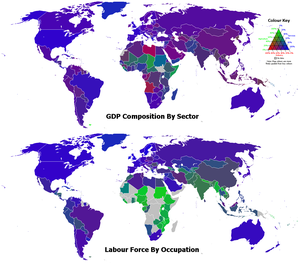This article's tone or style may not reflect the encyclopedic tone used on Wikipedia. (August 2023) |
| Part of a series on |
| Economics |
|---|
 |
| Part of a series on |
| Economic systems |
|---|
|
Major types
|

Service economy can refer to one or both of two recent economic developments:
- The increased importance of the service sector in industrialized economies. The current list of Fortune 500 companies contains more service companies and fewer manufacturers than in previous decades.
- The relative importance of service in a product offering. The service economy in developing countries is mostly concentrated in financial services, hospitality, retail, health, human services, information technology and education. Products today have a higher service component than in previous decades. In the management literature this is referred to as the servitization of products or a product-service system. Virtually every product today has a service component to it.
The old dichotomy between product and service has been replaced by a Service (economics) service–product continuum [1]. Many products are being transformed into services.
For example, IBM treats its business as a service business. Although it still manufactures computers, it sees the physical goods as a small part of the "business solutions" industry. They have found that the price elasticity of demand for "business solutions" is much less than for hardware. There has been a corresponding shift to a subscription pricing model. Rather than receiving a single payment for a piece of manufactured equipment, many manufacturers are now receiving a steady stream of revenue for ongoing contracts.
Full cost accounting and most accounting reform and monetary reform measures are usually thought to be impossible to achieve without a good model of the service economy.
Since the 1950s, the global economy has undergone a structural transformation. For this change, the American economist Victor R. Fuchs called it “the service economy” in 1968. He believes that the United States has taken the lead in entering the service economy and society in the Western countries. The declaration heralded the arrival of a service economy that began in the United States on a global scale. With the rapid development of information technology, the service economy has also shown new development trends.[1]
- ^ Victor R., Fuchs (18 July 2011). Who Shall Live?: Health, Economics and Social Choice. World Scientific Publishing Company. ISBN 9789814365642.